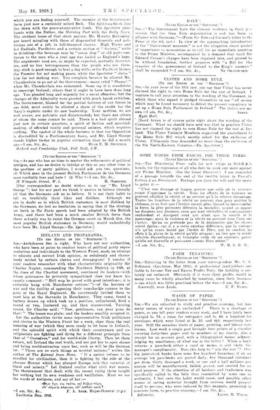IRELAND AND PROPAGANDA.
(To THE EDITOR OF THE " SPECTATOR.") SIR,—Archdeacon Bor is right. Why have not our authorities, who have been at pains to conduct tours of political party repre- sentatives and individuals to the Western Front, made no attempt to educate and correct Irish opinion, so sedulously and shame- lessly misled by certain clerics and demagogues? I wonder if your readers remember with what characteristic originality Sir Charles Napier, commanding the Northern District in 1839, at the time of the Chartist movement, convinced its leaders—with whose grievances he privately sympathized (how few know his caustic comment : " Hell may be paved with good intentions; it is certainly hung with Manchester cottons!")—of the horrors of war and the futility of opposing their ramshackle cannon to the guns of the Royal Regiment. He courteously invited them to meet him at the Barracks in Manchester. They came, found a battery drawn up which took up a position, unlimbered, fired a round or two, limbered up, and then manoeuvred. Turning round, Sir Charles said: "Now, gentlemen, can your guns do that? " The lesson was plain; and the leaders sensibly accepted it.
Let the authorities invite some representative Irish politicians and clerics to the Western Front for a week, show them the real meaning of war (which they seem ready to let loose in Ireland), and the splendid spirit with which their countrymen and co- religionists are fighting and dying for a different principle from that of " Ourselves," and for world-wide liberty. Then let them return, tell Ireland the real truth, and not put her to open shame and bring world-ostracism upon her, such as will be the German lot. " There are no such things as neutral nations," writes the author of The Retreat from Mons. " If a nation refuses to be enrolled for civilization, then it is fighting by the side of the obscene Horror which has plunged Europe into this carnival of blood and misery." Let Ireland realize what civil war means. The Government that dealt with the recent rising there taught her nothing but its own weakness and vacillation. Must we use the words of Antigone, and say of her :— etre: f-xEL aos rai)ra, ea/ del$as rcExa, err' etiyetip witpwcas, err' 408Aar FMK* ?


























 Previous page
Previous page